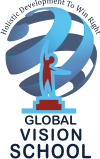At GVS, we believe that the primary purpose of all assessment practices is to support and enhance student learning by providing feedback that informs students and teachers about what has been learned and what is not yet understood.
We believe that the purpose of assessment is to support and enhance student learning by providing feedback that informs students and teachers about what has been learned and what is not yet understood. Assessment and evaluation are related, but serve different purposes and have distinct meanings.
Assessment:
Assessment is descriptive rather than evaluative, and serves as feedback so that as students practice they can extend what they have learned. This information also helps teachers plan where to go next with instruction based on student understandings of the material.
Assessment as learning refers to the active involvement of students in being critical assessors of their own learning goals and how to effectively address them. We believe that the key purpose of assessment is to help all students become better at monitoring and understanding their learning. Working with accurate, descriptive feedback, the goal is for students to become aware of what helps them learn and achieve better results, thus increasing their role in contributing to their own improvement.
Self assessment and reflection are necessary if students are to develop the skills and habits of self directed, independent, lifelong learners. Assessment for learning refers to formative assessment by which teachers collect information about student development and understanding. Assessment for learning is ongoing and provides the basis for determining what the teacher should do next to move student learning forward.
Evaluation:
Evaluation or assessment of learning refers to summative assessment whereby teachers collect data from a variety of sources to evaluate student performance in relation to curricular learning outcomes. This is often reported out and informs students, parents and others about student achievement. Evaluation or summative assessment should only occur at the end of teaching, after students have had several opportunities to refine their learning via feedback from formative assessment for and as learning.
At GVS, we believe that effective assessment practices will: Be focused on clear curricular learning outcomes or targets that both students and parents understand.
Provide students with descriptive feedback and time for monitoring, talking about, reflecting on and revising their learning.
Teach students to be critical assessors of their own learning. Through structured peer and self-¬assessment, students will be able to describe their progress in relation to intended learning outcomes and criteria and set future learning goals and continue to measure their success.
Inform teachers as they plan for instruction and enable them to determine next steps in improving student learning.
Include many formative assessments designed to guide the learning process prior to all major summative assessments.
Include a variety of opportunities for students to demonstrate the full range of their learning.
Be grounded in the belief that when students have many opportunities to receive descriptive feedback and time to think about and revise their learning, their performance will improve.
Not be designed to reward or punish student behaviour.

